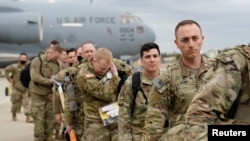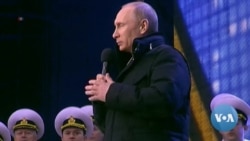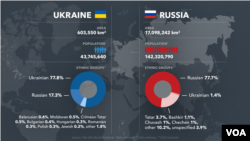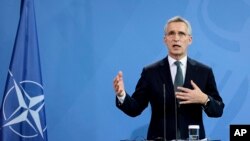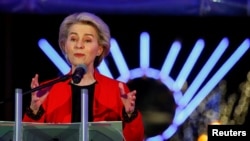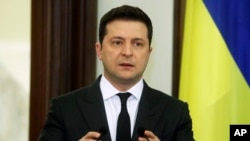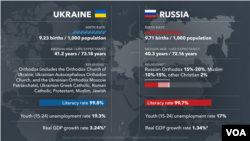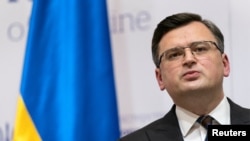The United States has information indicating that Russia has developed a plan to stage a false Ukrainian military attack on Russian territory and leverage it as a pretext for an attack against Ukraine, according to a senior Biden administration official.
U.S. intelligence officials say fabricating a video of such an attack is one of several options the Kremlin is formulating to give it an excuse to invade Ukraine, the official said.
"The video will be released to underscore a threat to Russia's security and to underpin military operations," said the official, who requested anonymity.
"This video, if released, could provide Putin the spark he needs to initiate and justify military operations against Ukraine," the official added.
The official said the Biden administration is disclosing specifics about Russia's alleged plans to "dissuade" Russia from carrying out such plans.
In an interview Thursday with MSNBC, U.S. deputy national security adviser Jonathan Finer said, "We don't know definitively that this is the route they are going to take, but we know that this is an option under consideration."
NATO welcomes more US troops
The Biden administration disclosed the intelligence after NATO Secretary-General Jens Stoltenberg on Thursday welcomed U.S. plans to deploy more troops to Europe and said NATO is considering sending additional battle groups to the southeastern part of its alliance amid tensions along the Russia-Ukraine border.
The U.S. on Wednesday announced plans to dispatching 2,000 more troops to Europe, most of them to Poland, and move 1,000 troops from Germany to Romania to bolster NATO's eastern flank countries.
The additional U.S. troops, part of the Army's 82nd Airborne Division, are "not going to fight in Ukraine" in the event of a Russian invasion of Ukraine, Pentagon spokesperson John Kirby told reporters. Rather, he said, the temporary deployment, which is separate from the 8,500 U.S. troops placed on heightened alert last week for possible dispatch to Europe, is intended as an "unmistakable signal that we stand with NATO."
Stoltenberg told reporters that while NATO is preparing for the possibility that Russia may take military action, NATO remains ready to engage in "meaningful dialogue" and find a diplomatic resolution to the crisis.
"NATO continues to call on Russia to de-escalate. Any further Russian aggression would have severe consequences and carry a heavy price," he said.
Kremlin spokesperson Dmitry Peskov told reporters Thursday that the U.S. deployment is heightening tensions in the region.
The United States and other Western allies have been preparing economic sanctions to level against Russia in hopes of persuading Russian President Vladimir Putin to pull back the more than 100,000 troops Russia has near the border with Ukraine. Russia has denied it plans to invade.
Stoltenberg said Thursday there has been a "significant movement of Russian military forces into Belarus," Ukraine's northern neighbor, where they are taking part in joint military drills that began Thursday instead of later this month as originally planned.
"This is the biggest Russian deployment there since the Cold War," Stoltenberg said, referring to what he said were 30,000 troops, fighter jets and missile systems.
Russia has not disclosed how many troops or the amount of military hardware it has in Belarus.
Thursday's exercises, which Stoltenberg said would continue until February 20, involved live fire, according to images released by the Belarusian defense minister. They also showed fighter jets in the sky and tanks firing and maneuvering.
Russian Defense Minister Sergei Shoigu witnessed the exercises after arriving in Minsk Thursday, and he also met with Belarusian President Alexander Lukashenko.
During the meeting, Lukashenko said, "We are forced to strengthen our border with Ukraine." He noted the joint drills, originally scheduled for February 10-20, were able to start early after Russian, Belarusian and other allied troops were deployed last month to quell violence in Kazakhstan and accomplished their mission "very quickly."
Russia has demanded NATO pull back troops and weapons deployed in eastern European member countries, and to make clear that Ukraine cannot join the 30-member military alliance.
NATO and Ukraine have rejected those demands, saying countries are free to pick their allies.
But Stoltenberg said Thursday that NATO is ready to talk to Russia about relations between the two sides, and about risk reduction, increased transparency and arms control.
EU plan response, show support for Ukraine
European Commission President Ursula von der Leyen said Thursday the 27-nation bloc is planning a response to letters Russia sent earlier this week to several EU members about its demand for security guarantees.
During a visit to Helsinki, von der Leyen told reporters, "We are united in the European Union and therefore it is clear that the response will mirror, will reflect that unity."
In Kyiv, Ukrainian President Volodymyr Zelenskiy said Thursday he welcomed Turkish President Recep Tayyip Erdogan's offer to mediate the crisis and to host peace negotiations. Zelenskiy's comments came after the two leaders signed a free trade deal and other agreements while meeting in Kyiv.
Erdogan previously suggested Turkey, a NATO member that also has good relations with Russia, could act as a mediator.
"I would like to thank President Erdogan for his initiative to become a mediator between Ukraine and Russia on the way to ending the war," Zelenskiy said.
Erdogan's visit to Ukraine is the latest in a series of visits to Kyiv by world leaders and diplomats to show support for Ukraine and try to advance a peaceful resolution to the crisis.
Talks Wednesday between Putin and British Prime Minister Boris Johnson did not provide any breakthroughs. French President Emmanuel Macron was expected to have a phone conversation with Putin later Thursday.
Macron and U.S. President Joe Biden discussed the Russia-Ukraine situation in a call Wednesday, with the White House saying the two leaders reviewed diplomatic efforts and "preparations to impose swift and severe economic costs on Russia should it further invade Ukraine."
The Norwegian Rights Council also warned Thursday about the effects on those living in eastern Ukraine if the crisis escalates.
After years of violence in the Donetsk and Luhansk regions, where Ukrainian forces have been battling Russia-backed separatists, the aid organization said the humanitarian needs are already high with nearly 3 million people relying on aid.
Ukrainian Foreign Minister Dmytro Kuleba addressed the conflict in a broader context at a news conference Wednesday, saying, "I'm confident that Russia's war on Ukraine and wider Europe will ultimately end when two fundamental issues are resolved. First, the West should turn from reactive to proactive strategies when dealing with Russia."
"Ambiguity on Ukraine's role as an indivisible part of the West has to be put to an end,” he added. “The Ukrainian people chose this course and defended it at a high price.
"We are historically, politically and culturally a part of the West," Kuleba said. "It is time to end harmful ambiguity which serves as a temptation for the Kremlin to continue its attempts to undermine Ukraine or reverse its course against the will of the Ukrainian people."
Some information for this report came from Agence France-Presse and Reuters.




